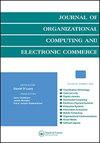A new multi-agent group-buying auction for automated VM-to-Customer mapping
IF 1.9
4区 管理学
Q3 COMPUTER SCIENCE, INFORMATION SYSTEMS
Journal of Organizational Computing and Electronic Commerce
Pub Date : 2021-01-02
DOI:10.1080/10919392.2020.1838847
引用次数: 2
Abstract
ABSTRACT This paper aims to allocate cloud resources (i.e., Virtual Machines: VM) to customers by using an auction-based multi-agent system. Adding the concept of group-buying to auction makes the possibility of having more winners. Group-buying offers resources at a reduced price on the condition that the number of purchases reaches a minimum number. Subsequently, the rate of successful deals, the speed of reaching agreements and monetary utility of the participants (i.e., providers and customers) will be increased. Due to having a massive number of clients with different characteristics and providers with various VM types in the cloud environment, it is obligatory to make the process of group-buying auction fully automated. By doing this automation, customers will be relieved of serious troubles such as coalition for group-buying, comparing the resources, bidding at auctions and so on. Three main requirements of this automation are as follows: (1) clustering similar customers in rational groups, (2) selecting the most suitable resource for each customer/group of customers, and (3) bidding during auctions on behalf of each customer/group of customers. A particular algorithm for each one of these requirements is presented in this paper. Through simulation experiments, the results of evaluations showed how significantly the proposed cloud market system improved the success rate of customers, the average time taken in resource selection, the average of providers’ financial utility, and the average of customers’ financial utility.一种新的用于自动VM到客户映射的多智能体团购拍卖
本文旨在通过基于拍卖的多智能体系统将云资源(即虚拟机:VM)分配给客户。在拍卖中加入团购的概念,可能会有更多的赢家。团购在购买数量达到最低限额的条件下,以较低的价格提供资源。随后,交易成功率、达成协议的速度和参与者(即供应商和客户)的货币效用将会增加。由于云环境中有大量具有不同特征的客户和具有不同VM类型的供应商,因此必须使团购拍卖的过程完全自动化。通过实现这种自动化,客户将摆脱诸如联合团购、资源比较、拍卖竞价等严重的麻烦。该自动化的三个主要要求是:(1)将相似的客户聚类到合理的组中;(2)为每个客户/客户组选择最合适的资源;(3)在拍卖期间代表每个客户/客户组进行投标。本文针对这些要求分别提出了一种特定的算法。通过仿真实验,评价结果显示了所提出的云市场系统在提高客户成功率、资源选择平均时间、提供商财务效用平均值和客户财务效用平均值方面的显著性。
本文章由计算机程序翻译,如有差异,请以英文原文为准。
求助全文
约1分钟内获得全文
求助全文
来源期刊

Journal of Organizational Computing and Electronic Commerce
工程技术-计算机:跨学科应用
CiteScore
5.80
自引率
17.20%
发文量
7
审稿时长
>12 weeks
期刊介绍:
The aim of the Journal of Organizational Computing and Electronic Commerce (JOCEC) is to publish quality, fresh, and innovative work that will make a difference for future research and practice rather than focusing on well-established research areas.
JOCEC publishes original research that explores the relationships between computer/communication technology and the design, operations, and performance of organizations. This includes implications of the technologies for organizational structure and dynamics, technological advances to keep pace with changes of organizations and their environments, emerging technological possibilities for improving organizational performance, and the many facets of electronic business.
Theoretical, experimental, survey, and design science research are all welcome and might look at:
• E-commerce
• Collaborative commerce
• Interorganizational systems
• Enterprise systems
• Supply chain technologies
• Computer-supported cooperative work
• Computer-aided coordination
• Economics of organizational computing
• Technologies for organizational learning
• Behavioral aspects of organizational computing.
 求助内容:
求助内容: 应助结果提醒方式:
应助结果提醒方式:


